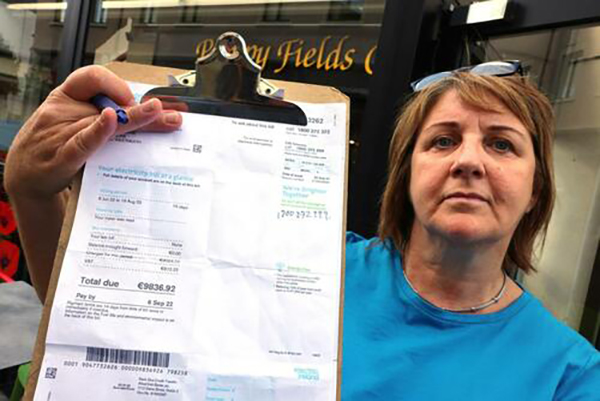Fuel supply crunch? US mulls Jones Act waiver to allow foreign tankers to boost oil supply
10/18/2021 / By Arsenio Toledo

The federal government is considering waiving a century-old shipping requirement to boost the country’s fuel supply after the cyberattack against the Colonial Pipeline, which led to fuel shortages along most of the East Coast.
The Department of Transportation (DOT) has reportedly “started the work needed to enable consideration of a temporary and targeted waiver of the Jones Act.”
The Jones Act of 1920 governs the rules regarding shipping and trade in the U.S. and its island territories. The aim of the act is to protect American businesses from foreign competition. According to the act, foreign ships may not transport goods between two American ports. A waiver would allow ships that were not built in the U.S. and crewed by American workers to carry goods between ports, including fuel.
Providing exemptions to Jones Act requirements for certain qualified vessels would allow foreign-flagged ships to step in and help the country fill the supply gap left by the Colonial Pipeline’s shutdown. (Related: The refinery shutdowns have begun: Two refineries paused due to pipeline cyber hack as America’s energy infrastructure shows shocking vulnerabilities.)
If the waivers were granted, the Jones Act-exempt fuel tankers would be tasked with taking the six- to seven-day journey delivering fuel from the Gulf Coast up to the New York Harbor. Alternatively, the U.S. could order more fuel cargoes from Europe, with ships taking between 10 to 14 days to reach the East Coast.
There are a number of Jones Act-compliant ships that are already being used to transport fuel from refineries in Texas and Louisiana to Florida. The Maritime Administration, an agency in the DOT, said it has started surveying these vessels to determine if they have sufficient capacity to help ease the supply crunch or if a waiver is still necessary to bring in more foreign ships.

While the DOT is taking the lead in assessing whether waivers will be necessary to solve the current fuel shortage, the actual decision to waive the requirements of the Jones Act will rest with the Department of Homeland Security.
White House under pressure to solve fuel shortage quickly
The move to take a look at the Jones Act comes as President Joe Biden faces increasing pressure to deal with fuel shortages along the East Coast.
Many states have reported experiencing fuel shortages, and social media has been filled with motorists lining up at gas stations to stock up on gasoline. The Colonial Pipeline Company, which operates the pipeline, said it expects to substantially restore operations within a week of the cyberattack.
Despite this supposed good news, Energy Secretary Jennifer Granholm still warned people to prepare for a possible supply crunch.
“I want to be clear that these states who are impacted [by the pipeline shutdown], even with the turning on of the pipeline system, they still may feel a supply crunch as Colonial fully resumes,” she said.
Granholm added that the Colonial Pipeline shutdown should serve as a warning for America. “It certainly is a reminder that we need to take a hard look at how we need to harden our necessary infrastructure, and that includes cyber threats.”
The federal government has already taken other steps to try and blunt the fuel supply concerns.
On Sunday, May 9, the White House issued an order temporarily extending the amount of time truck drivers are legally allowed to spend behind the wheel when transporting fuel across 17 states affected by the Colonial Pipeline shutdown. The order also affects Washington, D.C. On Tuesday, the Environmental Protection Agency waived gasoline volatility requirements in three Mid-Atlantic states and D.C.
Colonial Pipeline shutdown might last longer than expected
According to Jason Bordoff, co-founding dean of the Columbia Climate School, there is precedent for waiving the requirements of the Jones Act, especially as a response to times of crisis. The government waived the Jones Act in Nov. 2012 after Hurricane Sandy slammed into the East Coast, causing similar fuel shortages along with power outages.
Bordoff claimed two potential outcomes from granting waivers for the Jones Act. First, it may increase confidence in the economy to know that the federal government is willing to waive Jones Act requirements whenever it is necessary.
Second, contemplating the granting of waivers several days after the beginning of the shutdown may actually have the opposite effect and undermine confidence in the market because it is signaling to companies how quickly the Colonial Pipeline will really be able to get operations up and running to full capacity.
Some market analysts and cybersecurity experts are already speculating that the supply disruption won’t be as short-lived as Colonial claims.
“My best guess is that they are going to slowly bring this system back online,” said Robert Cattanach, a cybersecurity expert at law firm Dorsey & Whitney.
“We’re likely going to know how bad things are on restoring the pipeline in a couple days,” he added. “While this is going on, on a parallel track, the Jones Act process is playing out.”
Matthew Parry, an energy analyst at a consulting firm, believes the Jones Act waivers are only being considered because the Colonial shutdown might last longer than anticipated.
Learn more about how the Colonial Pipeline shutdown is gravely affecting the United States by reading the latest articles at Collapse.news.
Sources include:
Submit a correction >>
Tagged Under:
Collapse, Colonial Pipeline, crisis, cyberattack, disruption, economy, emergency, energy, fuel shortage, fuel supplies, fuel supply, gas, hoarding, Jones Act, pipelines, shortage, supply chain
This article may contain statements that reflect the opinion of the author
RECENT NEWS & ARTICLES
COPYRIGHT © 2017 COLLAPSE.NEWS
All content posted on this site is protected under Free Speech. Collapse.news is not responsible for content written by contributing authors. The information on this site is provided for educational and entertainment purposes only. It is not intended as a substitute for professional advice of any kind. Collapse.news assumes no responsibility for the use or misuse of this material. All trademarks, registered trademarks and service marks mentioned on this site are the property of their respective owners.





















